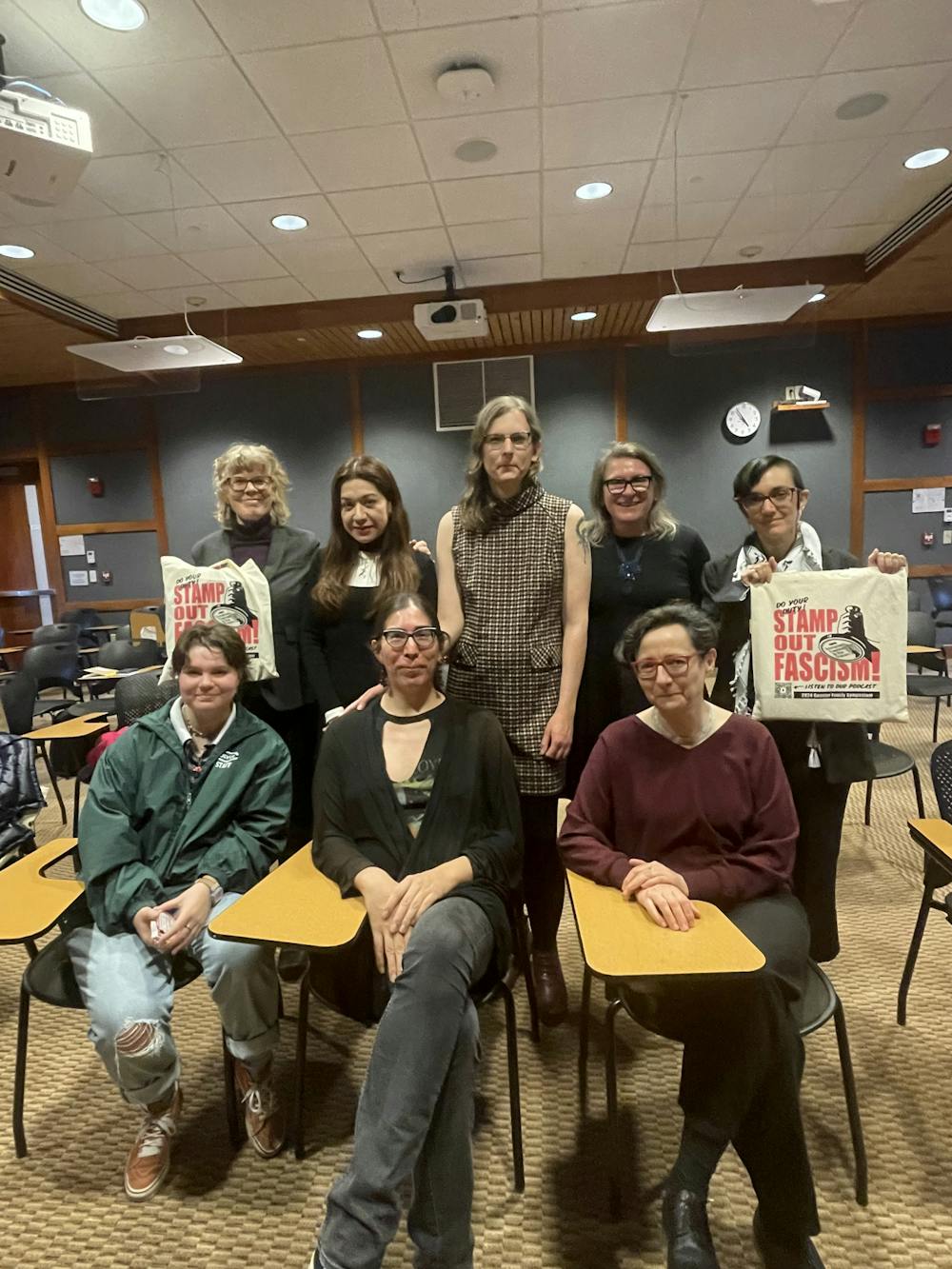The annual Gensler Family Symposium on Feminism in the Global Arena returned to Middlebury on April 11 and 12, with the theme “Feminism, Fascism and the Future.” The symposium aims to bring feminist scholars to campus to explore important world issues through a feminist lens.
Established in 2007 by the Gensler Family Foundation and hosted by the Gender, Sexuality and Feminist Studies (GSFS) program, the symposium selects a topic each year around which to structure the talks of the guest speakers. This year’s topic sought to explore the anti-gender movement and strategize ways to fight against it.
“The anti-gender movement wants to ban abortion, deny LGBTQ+ persons their rights, and, more broadly, curtail democratic institutions in order to make this happen,” Laurie Essig, professor of Gender, Sexuality, Feminist Studies, wrote in an email to The Campus. “Whatever our areas of specialization are, we all need to pay attention to the anti-gender movement.”
The topic was inspired by the podcast of the same name, which is a collaborative effort between Essig, Professor of Luso-Hispanic Studies Patricia Saldarriaga and Associate Professor of Writing and Rhetoric and Gender, Sexuality and Feminist Studies Catharine Wright. In the summer of 2023, the three traveled to Mexico City to interview feminist colleagues for the podcast.
El Fahey ʼ26 is in Essig’s “Feminist Theory” class, where she has spent the semester creating a podcast episode with her peers. Fahey is researching bills in Florida that perpetuate the anti-gender movement, such as the “Don’t Say Gay Bill.”
“The podcast is a work of love and feminist community — it involves students, colleagues (here at Middlebury and elsewhere) and friends trying to get word out about the anti-gender movement,” Essig wrote.
In September, the Gender, Sexuality and Feminist Studies department decided who they wanted to invite to speak at the symposium, some of whom were already podcast participants.
The first event, on April 11, was a silent podcast listening party of “Feminism, Fascism & the Future,” hosted by Essig. Attendees scanned a QR code to listen to the podcast on their devices with either their own headphones or ones that were provided. After listening to the episode, Essig facilitated a group discussion centered around the current policies in place that perpetuate anti-gender ideology and the structural changes that are necessary to combat them.
On April 12, the five speakers gave their talks, which were accompanied by a breakfast of bagels and lox, coffee and a catered lunch at Hillcrest.
“I really appreciated multiple talks on the anti-gender movement because it’s something that is very real in our country, yet not given enough publicity,” Daisy Kulina ʼ26 wrote in an email to The Campus.
Siobhan F. Guerrero Mc Manus, a researcher at the Center for Interdisciplinary Research in Sciences and Humanities, gave a talk titled “Discursive And Political Convergences Between The New Right And Trans-Exclusionary Feminism.” Mc Manus discussed the discursive convergences between the new right and trans-exclusionary feminism.
Journalist Julianna Neuhouser’s talk was titled “The Strange Marriage Of Right-Wing Anti-Gender Ideology Activists And Trans-Exclusionary Feminists,” and highlighted the key actors in the overlap between trans-exclusionary feminism and the right-wing anti-gender activists, particularly in Mexico.
“[Neuhouser] said that while Mexican left-wing parties are opening the door to right-wingers (in terms of gender discourse), in the U.S., TERFs [trans-exclusionary radical feminists] give right-wingers the ideology they need to keep the war on gender alive,” Kulina wrote.
Kulina attended both Mc Manus and Neuhouser’s talks, and wrote that they complemented one another by highlighting the harmful discourse that feeds the anti-gender movement.
Karina Bárcenas Barajas, senior researcher at the Social Research Institute of the National Autonomous University of Mexico, gave a talk titled “Anti-gender movements in Latin America: a genealogy between neoconservatism and post-fascism.” The talk considered evangelical politicization in anti-gender movements in Latin American countries.
Nicole Erin Morse, associate professor of Media Studies and director of the Center for Women, Gender and Sexuality Studies at Florida Atlantic University, gave a talk titled “DeSantis vs. Gender Studies: Fascism in the Freest State in the Nation.” Morse evaluated the DeSantis administration’s attack on academic freedom, and what it reveals about the masculinist, militaristic and apocalyptic impulse behind fascist attacks on gender studies in the U.S.
Agneszka Graff, associate professor at the American Studies Center at the University of Warsaw, gave a talk titled “Anti-Gender Politics: Traditionalism, Illiberalism, Or Neo-Fascism?” Graff’s talk explored the anti-gender worldview through the lens of what is happening in Spain, Hungary and Poland.
“I was so excited to see all these amazing scholars (and one journalist) of the anti-gender movement in one room,” Essig wrote. “It was so good to see them interact with one another, to think about what is the same and different about say, Florida, Mexico and Poland. And to imagine how feminist resistance can push back against these movements.”
Kulina wrote that the symposium helped her to understand facism’s negative effect on feminism and other political movements, and how taking time to learn about this helps mobilize people in the fight against the anti-gender movement. She commended the symposium for bringing to light issues that do not often receive sufficient public exposure.
Fahey agreed, adding that the events showed her the importance of putting feminism at the center of political discourse.
“I think that is the main thing we should take out of this symposium as a whole, is that feminism shouldn't be micro, it should be more on a macroscale and the generalness of feminism broadens the scope and can bring us all together to start a revolution,” Fahey said.
Ellie Trinkle ’26 (she/her) is a News Editor.
She writes a column called “Makes Ya Feel” for Arts & Culture where she discusses different art mediums. She is a Film and Creative writing major and previously served as a Staff Writer for The Campus. In her free time you can find her obsessively making Spotify playlists, reading, and spending time outside.




